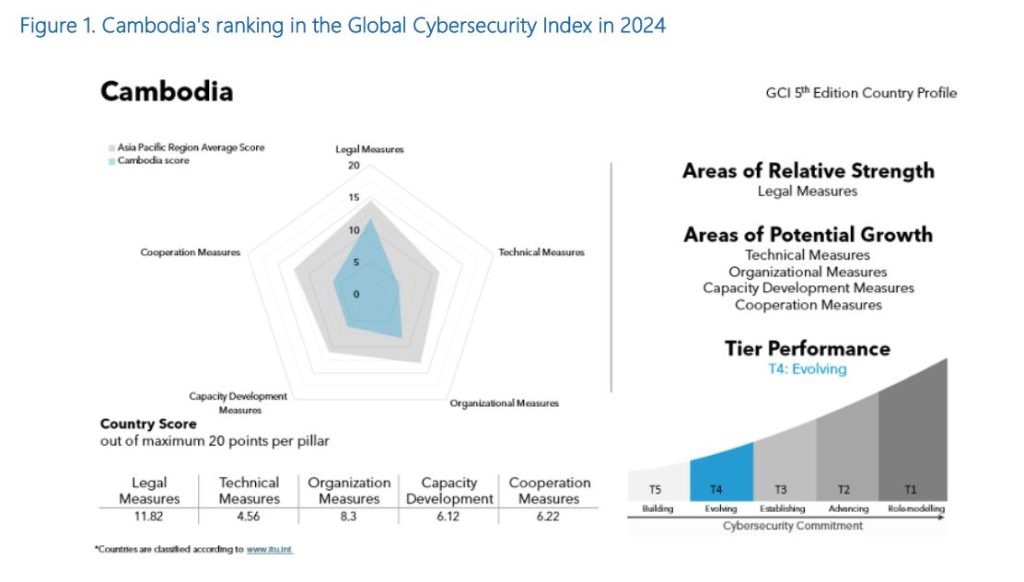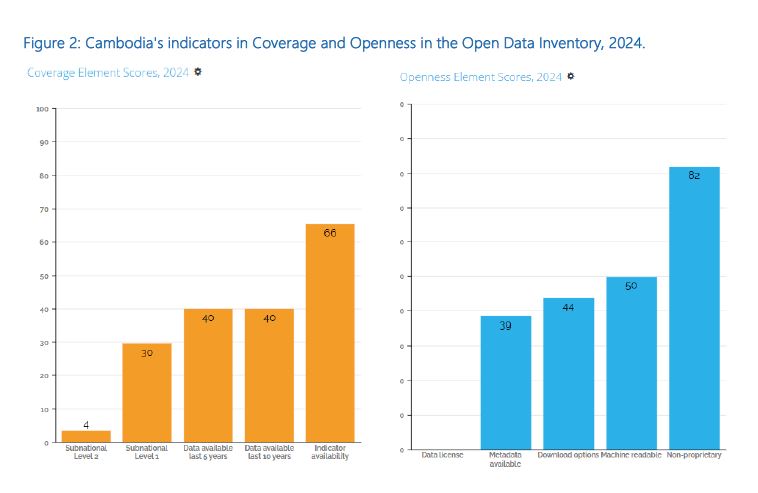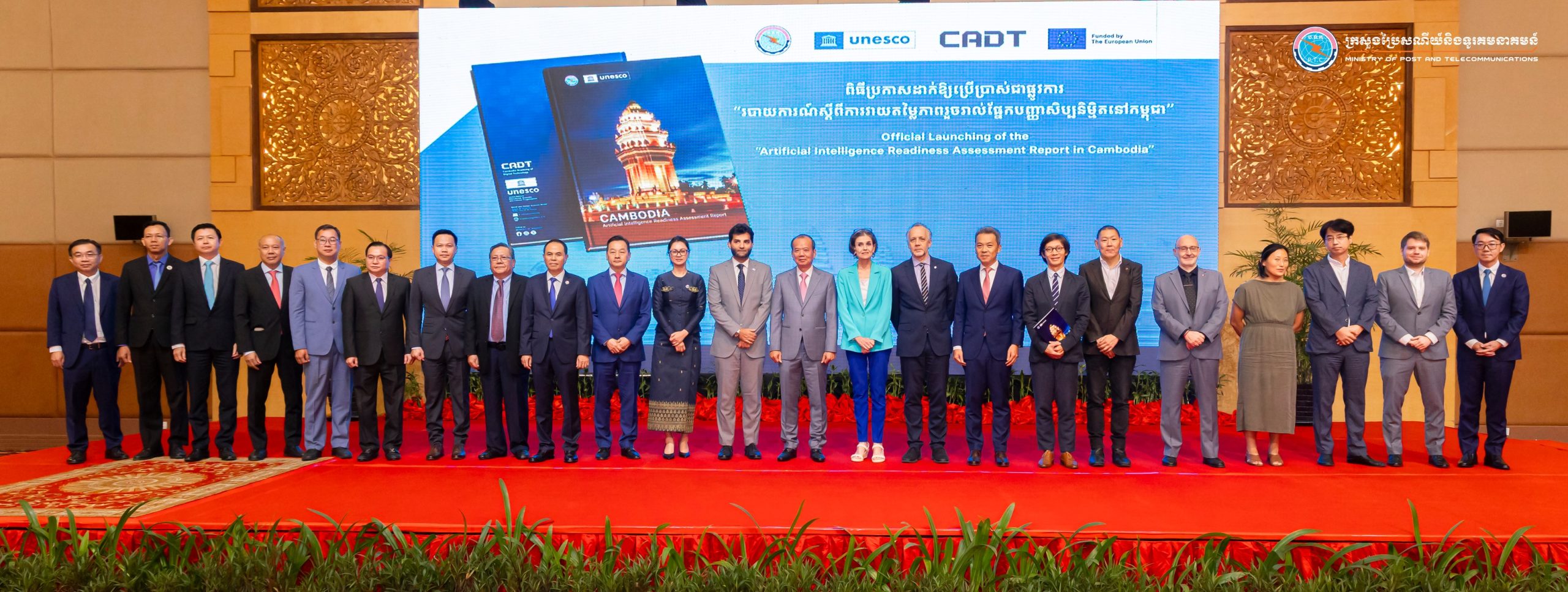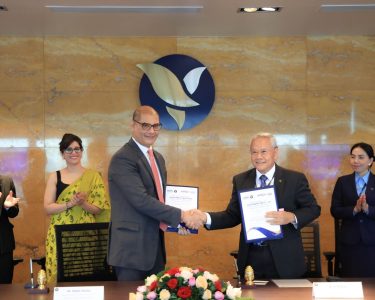Cambodia Investment Review
Cambodia is taking decisive steps toward establishing a national artificial intelligence (AI) governance framework, with support from the United Nations Educational, Scientific and Cultural Organization (UNESCO). The country’s AI readiness was evaluated using UNESCO’s Readiness Assessment Methodology (RAM), offering a comprehensive overview of its preparedness to govern AI systems ethically and inclusively.
The report, published in 2025, comes at a time when Cambodia is aligning its digital development ambitions with broader socio-economic goals—aiming to become an upper middle-income country by 2030 and a high-income country by 2050.
Building the Foundation for AI Governance
According to the assessment, Cambodia is progressing on key regulatory fronts. The Ministry of Post and Telecommunications (MPTC), under the leadership of H.E. Chea Vandeth, has spearheaded the drafting of foundational AI laws, including the Personal Data Protection and Cybersecurity laws. These efforts are complemented by draft AI ethics guidelines and engagement in regional ASEAN initiatives on AI governance and generative AI.
Read More: Temenos Showcases AI and Cloud Solutions to Accelerate Cambodia’s Banking Innovation
Yet, the country has not finalized a national AI strategy. Challenges remain in inter-ministerial coordination, cybersecurity maturity, and the integration of AI into public sector operations. Notably, there are no specific procurement guidelines for AI technologies, and citizens are not routinely informed when AI systems are used in public services.
Despite these gaps, Cambodia is playing an active role regionally, contributing to frameworks like the ASEAN Guide on AI Governance and Ethics and the ASEAN Responsible AI Roadmap.

Education, Research, and Digital Infrastructure See Mixed Progress
The scientific and educational ecosystem presents a mix of promise and persistent gaps. New master’s programs in data science and AI are incorporating ethics into their curricula. Collaborative work between the Cambodia Academy of Digital Technology (CADT) and UNESCO is helping to integrate ethical AI instruction in higher education. However, Cambodia’s R&D investment remains among the lowest in the region—just 0.09% of GDP—far below the ASEAN average of 0.84%.
In terms of AI-related research, the country produced over 400 AI-related publications over the past decade, with around 82% in collaboration with international partners. Ethical AI remains a central focus, accounting for more than 24% of all AI-related publications.
Infrastructure development is also advancing, with near-universal electricity access and an expanding digital footprint through platforms like CamDX and DataEF. However, Cambodia still ranks low in international benchmarks for cybersecurity (132nd globally), internet penetration, and statistical performance, as highlighted in the Global Cybersecurity Index.
Inclusion, Digital Trust, and Gender Gaps Remain Key Challenges
The report also highlights the need to improve digital trust and social inclusion. Cambodia ranks 120 out of 193 countries in the UN E-Government Development Index, and 95 out of 100 in the Economist’s Inclusive Internet Index for trust and safety.
Gender disparities remain stark in the AI and STEM fields. While girls outperform boys in science and reading, women are vastly underrepresented in tertiary-level STEM education. Initiatives like Sisters of Code and Technovation Cambodia are helping bridge the gap, but a comprehensive national strategy for digital gender inclusion is yet to be developed.
On the environmental front, Cambodia has not yet introduced policies to assess or mitigate AI’s carbon footprint or environmental impact. The report recommends integrating AI into national sustainability planning and regulatory frameworks, including efforts tied to Cambodia’s Nationally Determined Contributions (NDC).

Next Steps and Policy Recommendations
The RAM report concludes with a call to action for Cambodia to:
- Finalize and implement a national AI strategy
- Enact and operationalize data protection and cybersecurity laws
- Establish an AI governance framework with clear mandates
- Invest in AI talent development and public digital literacy
- Improve open data access, particularly in public services
- Expand digital infrastructure, especially in rural areas
“Cambodia is showing strong commitment to responsible innovation,” said Lidia Brito, UNESCO Assistant Director-General for Social and Human Sciences. “With the insights from this report, the country now has a clear roadmap to harness AI’s potential while ensuring ethical, inclusive, and sustainable outcomes.”
The partnership between UNESCO and the Royal Government of Cambodia marks a critical step in Southeast Asia’s broader push to integrate ethics into emerging technologies. If implemented effectively, Cambodia’s AI strategy could serve as a model for other developing economies navigating the opportunities and risks of rapid digital transformation.





